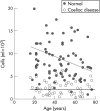Deficiency of invariant natural killer T cells in coeliac disease
- PMID: 17127705
- PMCID: PMC1954856
- DOI: 10.1136/gut.2006.095307
Deficiency of invariant natural killer T cells in coeliac disease
Abstract
Background: Immunoregulatory invariant natural killer (iNK) T cells rapidly produce interleukin (IL)-4 and other cytokines that suppress a Th1 response and are deficient in some autoimmune diseases.
Aim: The aim of this study was to investigate any deficiency of iNK T cells in coeliac disease.
Methods: Blood was collected from 86 subjects with coeliac disease and from 152 healthy control subjects for investigation of Valpha24+ T cells by flow cytometry. iNK T cells were assessed by Valpha24 and alpha-galactosylceramide/CD1d tetramer markers in 23 normal controls and 13 subjects with coeliac disease. Intracellular IL-4 was measured after anti-CD3 antibody stimulation. Duodenal biopsies were obtained in a subgroup of subjects with coeliac disease and control subjects for Valpha24 mRNA expression using relative PCR and for Valpha24+ T cells by immunofluorescence.
Results: The mean numbers of circulating Valpha24+ T cells and iNK T cells in coeliac disease were 27% (p<0.001) and 16% (p<0.001), respectively, of levels in control subjects. After in vitro anti-CD3 stimulation, numbers of IL-4+ producing iNK T cells from subjects with coeliac disease were unchanged but increased by 21% in control subjects. In subjects with coeliac disease, Valpha24 mRNA intestinal expression was reduced to 17% (p<0.001) by relative PCR and numbers of intestinal Valpha24+ T cells were 16% (p<0.01) of levels in control subjects.
Conclusions: We conclude that Valpha24+ T cells and iNK T cells are deficient in coeliac disease. We speculate that this deficiency could contribute to the failure of immunological oral tolerance that seems to underlie this disease.
Conflict of interest statement
Competing interests: None.
Similar articles
-
Increased Intraepithelial Vα24 Invariant NKT Cells in the Celiac Duodenum.Nutrients. 2015 Oct 30;7(11):8960-76. doi: 10.3390/nu7115444. Nutrients. 2015. PMID: 26529008 Free PMC article.
-
Invariant natural killer T cells in asthma and chronic obstructive pulmonary disease.N Engl J Med. 2007 Apr 5;356(14):1410-22. doi: 10.1056/NEJMoa064691. N Engl J Med. 2007. PMID: 17409322
-
Freshly isolated Valpha24+ CD4+ invariant natural killer T cells activated by alpha-galactosylceramide-pulsed B cells promote both IgG and IgE production.Clin Exp Immunol. 2007 Jun;148(3):555-63. doi: 10.1111/j.1365-2249.2007.03364.x. Epub 2007 Mar 15. Clin Exp Immunol. 2007. PMID: 17362268 Free PMC article.
-
CD34+ hemopoietic precursor and stem cells traffic in peripheral blood of celiac patients is significantly increased but not directly related to epithelial damage severity.Eur Ann Allergy Clin Immunol. 2008 Nov;40(3):90-103. Eur Ann Allergy Clin Immunol. 2008. PMID: 19334373 Review.
-
Flow cytometry for natural killer T cells: multi-parameter methods for multifunctional cells.Clin Immunol. 2004 Mar;110(3):267-76. doi: 10.1016/j.clim.2003.11.005. Clin Immunol. 2004. PMID: 15047204 Review.
Cited by
-
Phenotypic shift of small intestinal intra-epithelial type 1 innate lymphoid cells in celiac disease is associated with enhanced cytotoxic potential.Clin Exp Immunol. 2020 May;200(2):163-175. doi: 10.1111/cei.13414. Epub 2020 Jan 27. Clin Exp Immunol. 2020. PMID: 31907928 Free PMC article. Clinical Trial.
-
Persistent changes in circulating and intestinal γδ T cell subsets, invariant natural killer T cells and mucosal-associated invariant T cells in children and adults with coeliac disease.PLoS One. 2013 Oct 4;8(10):e76008. doi: 10.1371/journal.pone.0076008. eCollection 2013. PLoS One. 2013. PMID: 24124528 Free PMC article.
-
The immune cell composition in Barrett's metaplastic tissue resembles that in normal duodenal tissue.PLoS One. 2012;7(4):e33899. doi: 10.1371/journal.pone.0033899. Epub 2012 Apr 3. PLoS One. 2012. PMID: 22509265 Free PMC article.
-
Tissue-specific functions of invariant natural killer T cells.Nat Rev Immunol. 2018 Sep;18(9):559-574. doi: 10.1038/s41577-018-0034-2. Nat Rev Immunol. 2018. PMID: 29967365 Free PMC article. Review.
-
Alteration of the relative levels of iNKT cell subsets is associated with chronic mycobacterial infections.Clin Immunol. 2008 May;127(2):214-24. doi: 10.1016/j.clim.2007.12.005. Epub 2008 Mar 4. Clin Immunol. 2008. PMID: 18308638 Free PMC article.
References
-
- Marsh M N, Cummins A G. The interactive role of mucosal T lymphocytes in intestinal growth, development and enteropathy. J Gastroenterol Hepatol 19938270–278. - PubMed
MeSH terms
Substances
LinkOut - more resources
Full Text Sources
Medical







